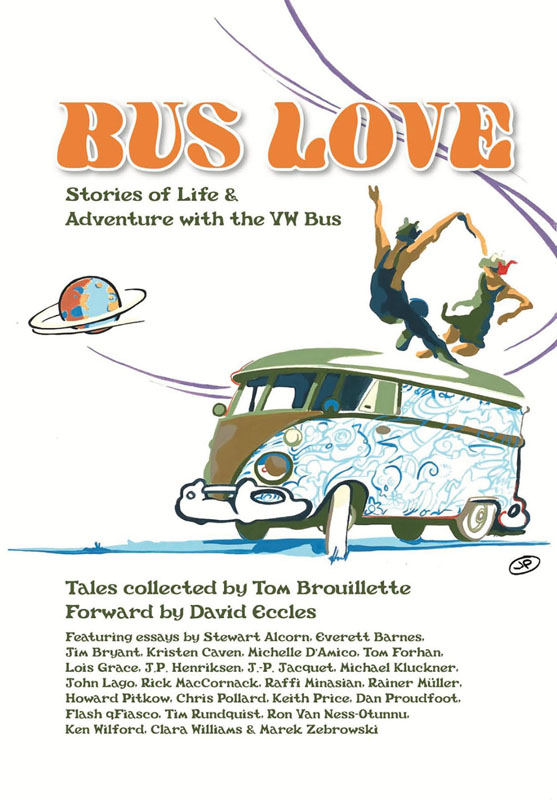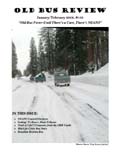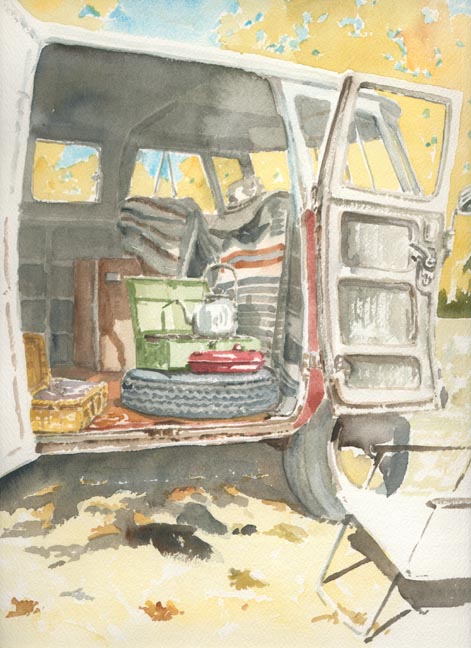*
Michael Kluckner
Return to "False Starts" page Return to home page
Last updated June 2, 2024
 |
Tom Brouillette, who used to run the Old Bus Review (referenced
below), has collected stories into a book called Bus
Love, available on Amazon and including the pieces I wrote
in about 2007, nearly a decade after my last fling with owning a
bus and when I was still mulling over the idea of writing "Van
Ordinaire." |
| 2008: The first
instalment of my "Mid-Life Crisis Bus Story," based on the time
when I had a bus and was contemplating the writing and artwork for
Van Ordinaire, has been
published in the USA in the January/February 2008 issue of the Old
Bus Review (pdf file, 2.6 mb). Here's part 2 in the Old Bus Review #106. Here's the final part, part 3, in the Old Bus Review #107 |
 |
|
A middle-aged man with memories as sharp as sciatica of wandering along the open road is concerned that he has become too settled to try anything new or, indeed, even to retry anything old. Once upon a time a charter member of the Order of the Volkswagen Bus, he had taken the vows of poverty (by only owning stuff that would fit in the bus) and utility (by knowing how to keep it running himself). A quarter century later, dragged down by a complicated, busy life, laden with useless possessions and unnecessary responsibilities, he wonders if he can recapture even a whiff of the unfettered joys of youth and its boundless future. However, being a conservative, truly middle-aged sort of a person, he can only do it cautiously, like the guy at a highschool reunion who dances hot and slow with an ancient girlfriend but has no real desire to sleep with her. Like a sticky sweet dessert, the reality can be disappointing, right? He is aware of the Winnebago warriors, most of them elderly, who have the spirit of wanderlust he had when he was young, and says to himself, well, it's only because they never went further than their hair-dryer cords could reach when they were young – that's why they're on the road now. But in their RVs they're not really travelling because they're pulling along enough stuff to fill a standard bungalow, and they congregate in ghettos with hook-ups and sani-dumps where they watch their TVs and while away the time between meals. The question nags at him: are they really losers, or are they merely more prosperous versions of what he once was? Risking ridicule from his wife and friends, he buys an old, rusted Volkswagen bus from a scruffy youth and sets off for California, retracing the route of a similar odyssey 25 years ago. The slow-moving hippie bus is not only his beast of burden, its windshield is a lens through which modern American culture -- fast-paced, strung out along the roadsides, isolated by wealth and technology – comes into sharper focus. Ironically, the lens works both ways, and he finds that strangers define him just through their perception of the old van. Louts flash peace symbols, gas jockeys ask whether he's heard that Jerry Garcia is dead, and seniors in RV parks shun him and won't invite him inside their motor homes to see their gun collections and discuss their operations. As it is a trip in the slow lane, he spends minimum time on the interstates and maximum time along the little roads – William Least Heat Moon's Blue Highways – along the coasts of Washington, Oregon and northern California. His raison de voyage, beyond escaping la horreur de domicile and rediscovering a slower pace, is to revisit the region within San Francisco's orbit. In the consumer-mad, gadget-obsessed 1950s and 1960s, a low-tech dream of beatniks and hippies living the simple life was invented there; then, in the 80s, a new, gadget-obsessed dream got started in the Silicon Valley just to the south. Nearing the dreaded half-century mark, he discovers he is
better able to come to terms with his need for roots and a
comfortable home while chugging through the countryside and
waxing nostalgic about the good old days of wandering on the
open road. Volkswagen buses, and his memories of fixing them and
keeping them running, become a metaphor for his evolution from
the "know-how" generation to the "know-how-much" one. |
Roadside bus, from the sketchbook |
The text above appeared in the NEATO Bus Club journal, obrlite@earthlink.net, in the autumn of 2005

En route to Oregon in the '66 bus.
Interior of the '66 bus, with the Mexican blankets bought in 1975 in Mazatlan thrown over the seats, on the beach in Oregon
|
A few images from a trip down the Washington and Oregon coasts--an experimental foray into the world of RVs and ancient hippies. Above: the uncamperized bus. Right: roadside sketches.
|
|
|
Note from Charlene Enns: Being a VW van owner myself, I particularly enjoyed your van interior pictures and narration of what it is to be behind the bus wheel. True, it is a different point of view that is particularly adverse to today's excessive culture. Volkswagen vans both by nature condemn and demand you to slow down, and most certainly make one understand that sometimes it isn't the destination but the journey that's important. Having said that, I parked the damn thing at the end of the driveway and opted for the reliability of a newer 2000 truck ! (grin!) But as weather warms, I feel the temptation to traverse the backroads of beautiful BC in my bus, the windows rolled down with warm summer air whipping by, the drone of the motor cruising steadily at 60, me smiling at the sheer minimalist aesthetics of its' design .... ahhh!!!! Good stuff ! Note from Michael Turner: I'm sixty five, retired navy, (thirty years), plus about eighteen more working in Japan for the navy as a civilian. We own a ' 63 bus and plan to do the blue moon road thing in a bit. We've been back in the states only seven or eight months. (I'm newly retired, this time from civil service) So when bus is up and ready off we go ... The only comment I might offer has to do with referring to the bus as a van.As in the title and later in the first paragraph Most recently on the Volkswagen web site www.thesamba.com there was a rather long "thread" with regard to the correct terminology for a splitwindow bus. I've noticed there's been similar threads on other VW related sites from time to time. What I've learned is most folks (at least in these parts) seem to prefer to call their Volkswagen Transporters (the original name Volkswagen applied to them) Busses as in Volkswagen Bus, or splitwindow bus, or perhaps "splitties". The term "van" is seen as generic. Perhaps even misleading. For example We have the "Chevy Van", the Chrysler mini-van, to name two. I looked up the term "van" in the New College Dictionary......it refers to a "van" as a "large covered truck". Somehow this wonderfull old vehicle that offers me escape into a new way of life doesn't deserve to be thought of as a "large covered truck". Even now if someone tell's me they have, or own, a Volkswagen "van", I might give pause to think.....what is that? A Euro-van? , A Westfalia van circa 1980, perhaps a ' 74 "bigwindow" (sometimes refered to as a "Baywindow" ) Note from Rick Jablonski, Roan Mountain, Tennessee: I enjoyed your story. Someone posted it to the type 2 list. Check out our group: fullmoonbusclub.com
Note from Joe Clark, Tallahassee Beach, Florida: Loved the precis of your unpublishable work, and the artwork is wonderful! You might enjoy another bus story: www.vanagon.com/fun/stories/maintenance.html. The illustration from the bus driver's point of view behind the windshield is superb! Note from an anonymous person, 2005: Although I do not own a bus myself, I do value the image this vehicle expresses. I can't think of another vehicle that can better represent a generation. Believe me, I am far from a hippie, but I do view a slower pace to make a journey more enjoyable instead of jetting to a destination. I made the mistake of blasting through a journey and I do regret it. Last year my generous Grandmother gave me her old car located in Victoria, BC. It was a 1997 Dodge Neon with 35k on the odometer. Driving across Canada was always a dream of mine. I drove exactly 4600km from Victoria, BC to Mississauga, ON in four days. As I reflect on my trip, I think about all the sights I missed. Although I deeply enjoyed the various landscapes of the country, I missed a lot of attractions. The last railroad spike in British Columbia, the stampede in Alberta, or the suspension bridge in Souris, Manitoba, I missed it all. Saskatchewan had nothing. I know that my accpetance to Royal Roads University will entice new journeys. I only hope to see them behind the wheel of a VW bus.
|